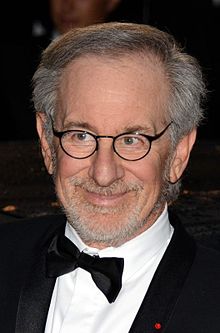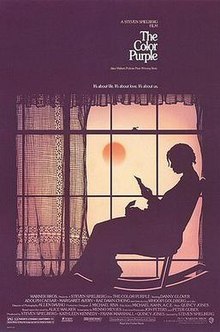 |
| Sorry. |
Four years ago I wrote an article about my issues with Steven Spielberg, particularly taking aim at Schindler’s List and AI, mostly from the Kubrickian critique I had developed at the time. As time has passed and I have seen hundreds more films to greater contextualise the man and his work, I decided it was time for a re-evaluation of Spielberg on my part. After all, the age of the “coffee table” Hollywood drama seems to be winding down, as studios continue their unfortunate output of sequels, reboots, and superhero franchises. I sometimes pine for the days when Hollywood at least made an effort and created Oscar bait - independent films dominated awards season this year, with American Sniper being the only studio film nominated for Best Picture. So this week I watched four films I had never seen before from Spielberg’s back catalogue, in the hope of being able to soften my stance towards him.
With détente declared, I watched Amistad, a film grounded in the little explored patch of American history between the revolution and the civil war. In 1839, slaves aboard La Amistad revolted and killed the ship’s crew, but were tricked by their hostage navigators into returning to America, where a lengthy legal battle ensued. Spielberg uses Amistad to give slavery the Schindler’s List treatment, to tell the story of a few good men and those they helped in a sea of evil. While I did find much to admire in Amistad, I found Spielberg’s handling too triumphant, especially with John Williams exultant score – one might believe that John Quincy Adams’ speech had ended slavery, for all of the pomp the ending is given.
 It could have been a much better film, perhaps even something to rival 12 Years a Slave. However, in the hands of a lesser director, Amistad would have simply been a film about white saviours “freeing” African prisoners, and I do applaud Spielberg for how he handled the Africans, especially the character Cinque, who knows that he is free, and does not need any white man to tell him so.
It could have been a much better film, perhaps even something to rival 12 Years a Slave. However, in the hands of a lesser director, Amistad would have simply been a film about white saviours “freeing” African prisoners, and I do applaud Spielberg for how he handled the Africans, especially the character Cinque, who knows that he is free, and does not need any white man to tell him so.
 It could have been a much better film, perhaps even something to rival 12 Years a Slave. However, in the hands of a lesser director, Amistad would have simply been a film about white saviours “freeing” African prisoners, and I do applaud Spielberg for how he handled the Africans, especially the character Cinque, who knows that he is free, and does not need any white man to tell him so.
It could have been a much better film, perhaps even something to rival 12 Years a Slave. However, in the hands of a lesser director, Amistad would have simply been a film about white saviours “freeing” African prisoners, and I do applaud Spielberg for how he handled the Africans, especially the character Cinque, who knows that he is free, and does not need any white man to tell him so.
I followed Amistad with The Colour Purple, a story about Celie, a black woman raised in the American south in the first half of the twentieth century. When we meet Celie she is fourteen and pregnant with her second child by her father. Her life fails to improve after that, as she is married to a drunken widower who rapes and abuses her, and has to raise his rotten children. In the book, Celie finds strength by pursuing a lesbian relationship with her husband’s mistress, a relationship that is explored briefly in the film. After years of heartbreak and abuse Celie finally gets her Spielberg ending, but unlike some of his other films, we are aware of what it has cost her. The Colour Purple is incredibly emotional, helped by the fact that it does not use a score by John Williams, allowing the audience to arrive at the dark conclusions of the film themselves. For the first time since I watched Jaws I found a Spielberg film I could genuinely call great. We should all be frustrated that he frequently settles for less.
Soon thereafter I sat down to Catch me if You Can. I have, really, nothing to say about it – something I find quite frustrating in a film. Like all of Spielberg’s worst films, it left nothing unsaid – all of the loose ends were tied up quite nicely, and nobody was forced to think too hard. I was at this point in a state of ambiguous ambivalence, and decided to see if his directorial debut, Duel, could help me sort out how I felt. Duel is a low budget film about a man trying to avoid a faceless truck driver as he is narrowly rammed off the road repeatedly. The cars are fast, the chase scenes are suspenseful and the aesthetics are beautiful – I was hooked. I rooted for our protagonist the entire time, trying to figure out the motives of the truck driver, and happy that there were no tidy answers freely given, until about halfway through a thought occurred to me – “what if the truck doesn’t symbolise anything?” When the film was over I felt a bit cheated - no answers are given in Duel, but only because there’s nothing worth saying.
As someone who watches an absurd amount of films, with the sincere hope that I am learning something, at the very least empathy and culture, from them, I am now left with a question – can a film with the express purpose of simply entertaining us ever be considered great? Do films require a cerebral, intellectual dimension, or can the feelings they instil in us carry them alone? Looking at the top grossing films of 2014, another Transformers, the third Hobbit film, and Guardians of the Galaxy, it seems the answer for many is no – not a surprise, as many use the cinema to escape. And that is fine, as long as we know the difference between art and entertainment, but Spielberg routinely sacrifices the former for the latter and is praised for it, and that’s why I still don’t like him.
_poster.jpg)
I can't remember The Colour Purple, but I talked about the music score thing in 'An Aversion to Music in Films and Video Games'. It's really frustrating that someone who is an adept film maker makes so many concessions to the art of filming. There's no doubt in my mind that Spielberg is a great film maker, but man, at times it seems so by-the-numbers and manipulative in its attempts to pull at the heartstrings.
ReplyDeleteThe two best films I have watched lately are Drive (Nicolas Winding Refn) and Under the Skin (Jonathan Glazer). The latter being very Kubrickian in its detachment, but also appropriately so for the subject matter.
Side query:
I've been curious lately as to why there are so few modern films about Native Americans and their history with colonialism. It seems almost odd that American film has solely concentrated on slavery as an attempt to understand race relations. I guess, beyond Dances with Wolves and The Last of the Mohicans, there's nothing else that really springs to mind about that period in American history. I mean, there's enough films out there, I'm sure, but certainly not huge big-name director productions on the scale of African-American slavery stories.
I'll have to check out Under the Skin.
DeleteI agree about the Native American films - have you seen Apocalypto?
No I haven't. I've tended to avoid anything involving Mel Gibson. Still haven't watched Passion of the Christ - do I need to? I mean really? Apocalypto does look good though.
DeleteI wouldn't know - I have never seen The Passion of the Christ either!
Delete